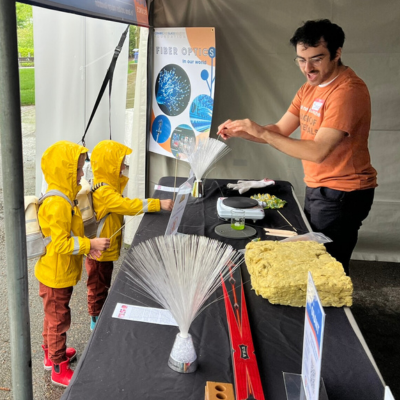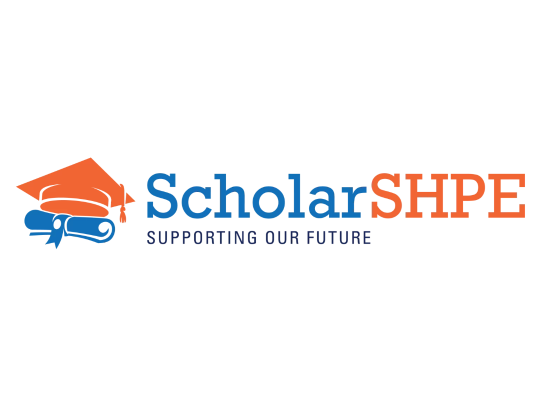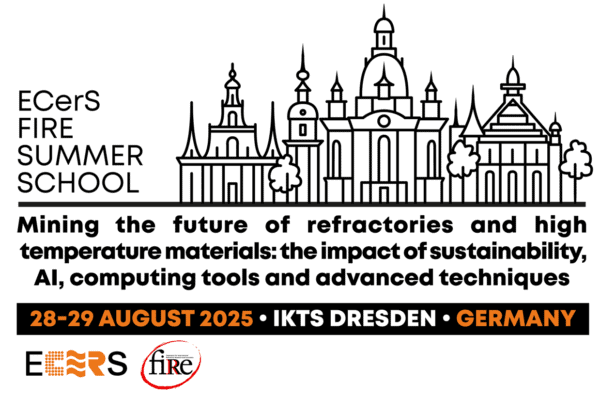Tucked between sloping hills in a rural, southeast sector of Brazil, children in the municipal Maripá de Minas dream of becoming veterinarians and farmers. Many don’t think of pursuing a higher education, likely because they don’t know what opportunities await them in Brazil or beyond.
Isabella Loureiro Muller Costa, a third year Ph.D. candidate in materials science and engineering at the University of California Davis and Brazil native, plans to show these students what their future could entail with her outreach efforts.
“The students don’t have the knowledge or don’t open their eyes for what they can do. They feel that their life is this and nothing is going to change, they’re going to still live on the farm,” Costa says. “When I got into outreach, that was my first idea: ‘Can I do something in Brazil?’”

Costa knew little about materials science until she learned about it during her time as an undergraduate student. She holds a master’s in materials science and engineering from Pontifical University Catholic of Rio de Janeiro and a bachelor’s in mechanical engineering from the University of Rio de Janeiro State, but her true passion lies in materials science.
Now, her goal is to expose students in Brazil to materials science at an earlier age. Costa hopes that this will also encourage students there to want to pursue a higher educational degree like she did.
“I know that it’s difficult in Brazil to get a higher degree,” Costa says. “But even though it’s difficult to get, it’s possible if they study and they work hard for it. So I want to show them that they could do it, that they can reach that goal, and that there are a lot of opportunities out there.”
According to the International Trade Administration, there are 47.3 million students enrolled in basic education in Brazil and only 8.4 million of them are a part of the higher education sector, which comes out to about 5.6 percent.
After joining the President’s Council of Student Advisors (PCSA) outreach committee last year, Costa immediately began planning her first outreach project in Brazil.
With some help from the outreach committee chair and Ph.D. candidate at Penn State University Nathan McIlwaine, she began writing her kit grant application. She received funding and mini materials science classroom kits from the Ceramic and Glass Industry Foundation (CGIF), also under ACerS.
Costa’s project idea, titled “Materials’ Magic,” involves bringing CGIF mini materials science kits to a school in Brazil to expose them to materials science and spark their interest in it.
“She stood out so much because she had an idea, and it was a really good idea, and then she did it,” McIlwaine says. “All steps along the process, she took initiative and she made it happen.”
Costa first traveled to Escola estadual Wallter Trezza in Maripá de Minas last February to introduce the students to one of the experiments from the mini kit. Eduardo Siriaco Trezza, a geography teacher at the school, helped coordinate the project.

“The first thing that I asked was, ‘You guys want to do a higher degree, you want to go to university, what do you want to do?” Costa says. “I would say 90 percent want to go to vet school, because that (is) their life. They live on farms, they deal with animals.”
After her initial visit, she planned to return in May with more mini kits in her suitcase to carry out the full Materials’ Magic project. The objective was to demonstrate all seven of the mini kit experiments this time. Due to COVID-19, Costa has been unable to return, but her goals remain the same.
“I want to make sure that they can change (their lives) if they want to,” Costa says. “And I want to not only show that, but also give the resources that they need to move forward if they want.”

As of August, Costa has still been unable to return to Brazil, but the teachers have moved forward by experimenting with the kits each Friday. Although the project hasn’t panned out exactly as planned, Costa remains optimistic that it will still leave a positive impact on the students.
The PCSA shares Costa’s goal to give back to students on an international level. McIlwaine says that throughout his first year with the PCSA, he noticed that there wasn’t a clear solution to increasing distribution of the mini kits outside of the U.S.
According to McIlwaine, it’s taken international PCSA delegates like Costa to make this international distribution and outreach happen. Packing the mini kits into checked luggage allows for easy delivery to international PCSA delegates in France, Germany, and England.
“It took members like Isabella, and Megan and Spencer and Matt and Ruth, all of these different members are the ones who actually make it happen,” McIlwaine says. “And I think we’re still working on that phase.”
At UC Davis, Costa collaborates on other projects, like an initiative called Engineering Superheros. Engineering Superheros is designed to inspire future STEM professionals by combining materials engineering with the ever-enticing lure of superheroes.
Dr. Ricardo Castro, Costa’s advisor, leads the initiative along with Costa and fellow PCSA member Spencer Dahl. Together, the team produced the first episode of Engineering Superheros—explaining the science behind Captain America’s shield—and Costa even translated the dialogue into Portuguese subtitles.
“I’ve been only impressed by her performance,” Castro says. “She’s very proactive. She likes to help everyone, so she builds a personality to the group; you can see that the group is a group because her personality brings everyone together.”
Engineering Superheroes comes with lesson plans for teachers at varying grade levels. Castro, who serves as the secretary-elect for the Basic Science Division of ACerS and the editor in chief for the International Journal of Ceramic Engineering and Science, also teaches a course called Materials Marvels at UC Davis. The course uses superheroes again to help portray the science of materials and engineering.
“Superhero movies—those are fun to watch,” Castro says. “So we bring a little bit of that enthusiasm to the classroom and make sure they are learning something.”
Like Costa, Castro aims to make science fun while also attracting students to the field. Costa feels as though her path would have been paved differently if she’d been exposed to materials science earlier in life.
“I feel that if I had this opportunity, the opportunity that I gave to them when I was in their position, my life would be a little bit different …” Costa says. “So maybe this can change one person’s life.”
Help us continue to inspire the next generation of ceramic and glass professionals. Give now at ceramics.org/donate.

Categories
- Feature Stories
- Materials Science Kits
- Project Grants
- Student Outreach


